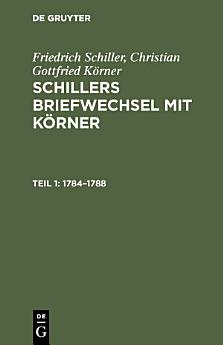1784–1788
મે 2019 · Walter de Gruyter GmbH & Co KG
ઇ-પુસ્તક
404
પેજ
reportરેટિંગ અને રિવ્યૂ ચકાસેલા નથી વધુ જાણો
આ ઇ-પુસ્તક વિશે
Keine ausführliche Beschreibung für "1784–1788" verfügbar.
લેખક વિશે
Friedrich Schiller was born in Marbach, Germany, the son of an army surgeon, a profession for which he himself was later educated. He never wanted to practice medicine, however, and found an outlet for his dissatisfaction in writing poetry and plays. Schiller's first play was to be performed was The Robbers (1781), a rallying cry for the freedom and idealism of youth against the tyranny and hypocrisy that Schiller saw all around him. The play was an immediate success, but Schiller, who had taken unauthorized leave from his regiment to watch the performance, was arrested and forbidden by the ruling Duke to write anything but medical books in the future. In defiance of the order, Schiller fled the duchy and, although suffering great poverty, continued to write. The remainder of Schiller's life was a struggle against poverty and, in his last years, a struggle against tuberculosis. Each of Schiller's nine plays is a masterpiece of situation, characterization, subtle psychology, and brilliant dramatic technique. Most of his plays focus on historical subjects, such as Mary Queen of Scots, Joan of Arc, or the Swiss hero William Tell. Schiller uses these period characters and settings to suit his own themes, which center on individual freedom, justice, and heroism. He often sacrifices historical accuracy in order to make a point. Schiller's place in German literature is very near the top. Among German dramatists there are none better, and perhaps only his friend German poet and playwright Goethe can be called an equal.
આ ઇ-પુસ્તકને રેટિંગ આપો
તમે શું વિચારો છો અમને જણાવો.
માહિતી વાંચવી
સ્માર્ટફોન અને ટૅબ્લેટ
Android અને iPad/iPhone માટે Google Play Books ઍપ ઇન્સ્ટૉલ કરો. તે તમારા એકાઉન્ટ સાથે ઑટોમૅટિક રીતે સિંક થાય છે અને તમને જ્યાં પણ હો ત્યાં તમને ઑનલાઇન અથવા ઑફલાઇન વાંચવાની મંજૂરી આપે છે.
લૅપટૉપ અને કમ્પ્યુટર
Google Play પર ખરીદેલ ઑડિઓબુકને તમે તમારા કમ્પ્યુટરના વેબ બ્રાઉઝરનો ઉપયોગ કરીને સાંભળી શકો છો.
eReaders અને અન્ય ડિવાઇસ
Kobo ઇ-રીડર જેવા ઇ-ઇંક ડિવાઇસ પર વાંચવા માટે, તમારે ફાઇલને ડાઉનલોડ કરીને તમારા ડિવાઇસ પર ટ્રાન્સફર કરવાની જરૂર પડશે. સપોર્ટેડ ઇ-રીડર પર ફાઇલો ટ્રાન્સ્ફર કરવા માટે સહાયતા કેન્દ્રની વિગતવાર સૂચનાઓ અનુસરો.






